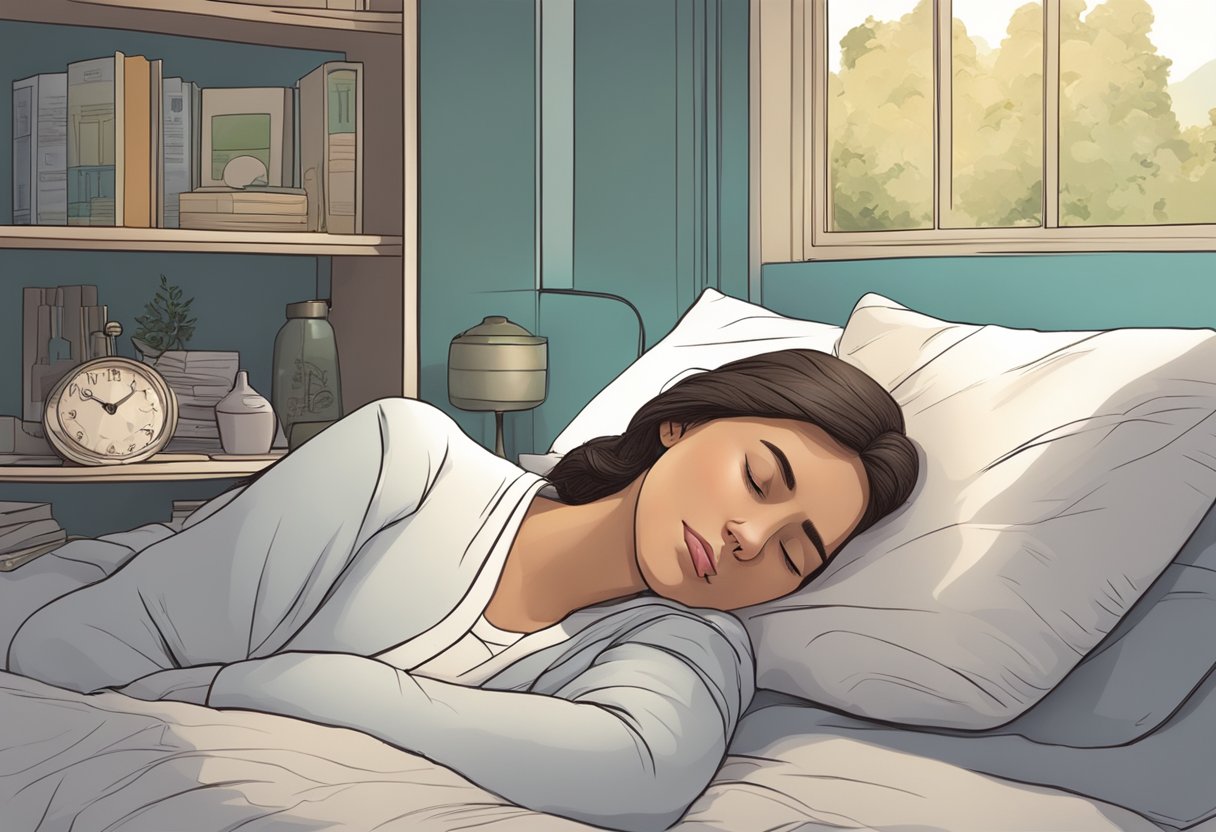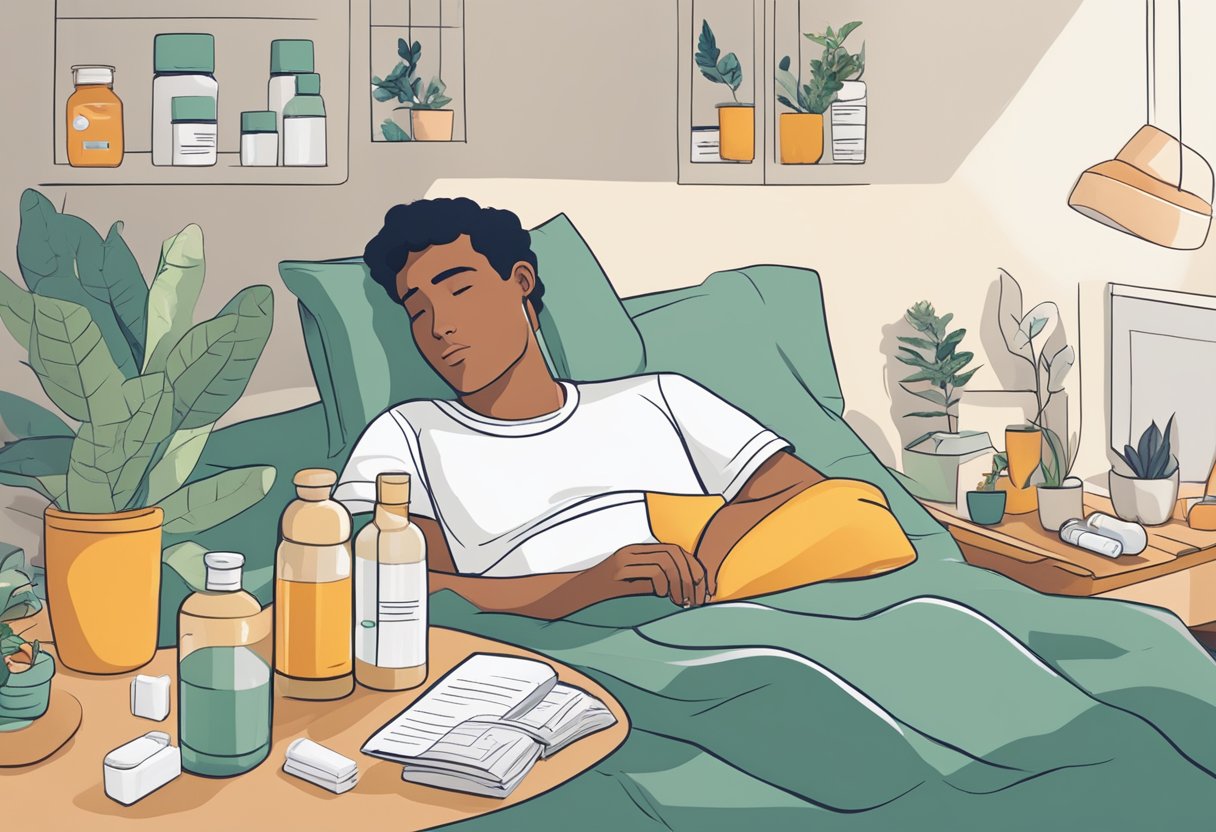Many people wonder if Ozempic affects sleep, as it is commonly used to manage diabetes and aid in weight loss. While there is no strong evidence linking Ozempic to insomnia or significant sleep issues, some users may notice changes in their sleep patterns. Fatigue can also occur, although it is not very common.
Sleep experiences with Ozempic vary from person to person. Some individuals report improved sleep quality, while others may experience mild issues, such as tiredness or difficulty falling asleep. It’s essential to consider factors like diet, stress, and overall health when assessing sleep changes during treatment.
Understanding how Ozempic affects sleep can help users manage their rest and well-being more effectively. Being aware of potential effects and methods to improve sleep can help during treatment.
Key Takeaways
- Ozempic typically does not cause serious sleep problems.
- Some users experience improved or slightly altered sleep quality.
- Managing health and lifestyle contributes to better sleep while using Ozempic.
- Comfort becomes even more important. People taking Ozempic may feel more physically sensitive, so mattresses with pressure-relieving layers help ease soreness and tension.


Ozempic is a medication primarily used to control blood sugar and support weight management. It targets specific hormones in the body to regulate appetite and glucose levels. Doctors prescribe it for certain health conditions, and its effects may also influence sleep patterns.
What Is Ozempic
Ozempic is the brand name for semaglutide, a drug that falls under the class of GLP-1 receptor agonists. These medications mimic a natural hormone that helps manage blood sugar and reduce appetite. It is administered as a weekly injection. Most patients use it to manage type 2 diabetes. However, it has gained popularity for weight loss since it slows digestion and curbs hunger.
While it offers several benefits, it may cause side effects such as nausea or mood changes. These can indirectly impact sleep in some individuals.
How Ozempic Works
Ozempic imitates the GLP-1 hormone, which prompts the body to release insulin and lower blood sugar following meals. It also slows the rate at which the stomach empties, so people stay full for longer. This delayed digestion leads to reduced hunger and lower food intake. In the brain, GLP-1 hormone activity also suppresses appetite more directly.
By managing appetite and blood sugar spikes, Ozempic contributes to improved metabolic health. These effects can also enhance sleep, as stable blood sugar often supports better sleep quality. However, some users report disrupted sleep, which may stem from side effects or shifts in mental well-being linked to the medication.
Primary Indications for Ozempic
Doctors usually prescribe Ozempic to adults with type 2 diabetes who require better blood sugar control. It is not intended for type 1 diabetes or diabetic ketoacidosis. They may also recommend it for individuals with obesity or excess weight, especially when other health risks are present.
Weight loss can help improve conditions such as obstructive sleep apnea, so Ozempic might ease certain sleep-related symptoms by reducing body weight. Medical supervision is necessary to weigh the benefits against potential risks, including its effects on sleep and mood. For more on how Ozempic relates to sleep, see research on ozempic and sleep.

Ozempic, a medication containing semaglutide, is used mainly to manage type 2 diabetes and support weight loss. Some users wonder if it causes problems with sleep or leads to insomnia. Research and user reports show mixed experiences, with many not finding a clear link but some noting changes in their sleep patterns.
Is Insomnia a Side Effect of Ozempic
There is no strong scientific proof that Ozempic directly causes insomnia. Clinical studies and official drug guides do not list insomnia as a common side effect. However, a small number of people report difficulty falling or staying asleep while taking the drug. These cases may be influenced by other factors, such as anxiety or changes in metabolism.
Some patients even report better sleep after starting Ozempic, possibly due to improved blood sugar control. Fatigue and tiredness are more common side effects, which can affect sleep indirectly.
Does Ozempic Affect Your Sleep
Ozempic might impact sleep quality in different ways. Fatigue is a reported side effect, affecting over 0.4% of patients according to the FDA. Feeling tired could cause someone to sleep more or disrupt usual sleep cycles.
Some experts suggest that medications like Ozempic can contribute to mental health changes, which may then interfere with sleep patterns. However, these effects are not direct and are not experienced by everyone.
Research on Ozempic, a medication containing semaglutide, shows mixed effects on sleep, specifically regarding insomnia and other sleep problems. Some users report sleep difficulties, while other studies explore its potential influence on sleep apnea. Understanding these findings helps clarify Ozempic’s impact on sleep health.
Overview of Studies Linking Ozempic and Insomnia
Several reports indicate that some people using Ozempic experience insomnia or trouble sleeping. These accounts focus on users feeling restless or unable to fall asleep before bedtime. Such sleep issues may relate to the drug’s effects on the nervous system or mental state.
Clinical discussions mention that semaglutide, the active ingredient in Ozempic, might trigger restlessness, which can lead to poor sleep quality. Mental health side effects linked to GLP-1 receptor agonists, including anxiety or mood changes, can also affect sleep. While causation is not fully proven, the link between ozempic and insomnia is being actively studied.
Interpretation of Existing Evidence
The evidence connecting Ozempic and sleep disorders remains limited and somewhat conflicting. Some studies suggest that while Ozempic may lead to insomnia in certain individuals, it might also help reduce symptoms of obstructive sleep apnea (OSA), especially in people with obesity.
Weight loss from Ozempic and related drugs could lessen OSA severity, offering sleep benefits. However, side effects like insomnia may be more common among sensitive users or during early treatment stages. Researchers emphasize the need for further controlled studies to better understand semaglutide’s overall effect on sleep.

Several factors affect how Ozempic impacts a person’s sleep. These include how the medication is taken, the patient’s health background, and whether they use other drugs that might interact with Ozempic. All these can change the risk of sleep problems like insomnia or restlessness.
Dosage and Administration Patterns
The timing and amount of Ozempic taken can influence sleep quality. Higher doses or starting a new dose may increase gastrointestinal side effects, such as nausea, which some users say disrupt their sleep. Some people experience trouble falling asleep when their body adjusts to the medication.
Taking Ozempic late in the day might increase the chance of insomnia or restlessness. People are often advised to follow a consistent schedule, usually once a week at the same time, to reduce sleep disturbances. Adjustments to dose or timing should always be done under medical supervision.
Individual Health Conditions
A person’s overall health strongly affects how Ozempic influences sleep. Conditions like diabetes and obesity themselves can cause poor sleep or insomnia. Additionally, gastrointestinal discomfort linked with Ozempic might worsen sleep problems for these individuals.
Mental health is another factor. Some users report anxiety or restlessness linked to Ozempic, impacting their ability to sleep well. Genetics and lifestyle also influence how a person reacts to the drug, changing the risk of sleep issues like fatigue or insomnia.
Interaction with Other Medications
Using Ozempic along with other drugs can change its impact on sleep. Some medications might cause combined side effects that increase tiredness or insomnia. For example, stimulants or antidepressants taken with Ozempic could affect sleep patterns.
It is important for patients to inform their healthcare provider about all medications they use. This helps identify possible interactions that could affect sleep. Adjusting medications or doses can reduce negative effects and improve sleep quality while on Ozempic.

Some people who use Ozempic report sleep problems, such as difficulty falling or staying asleep. Although insomnia is not a common side effect, paying attention to sleep patterns and recognizing when to seek help remains essential for managing possible Ozempic-related issues.
Identifying Symptoms of Sleep Disturbance
People taking Ozempic might notice trouble falling asleep, waking up frequently during the night, or feeling restless before bed. These symptoms could point to insomnia or sleeplessness related to Ozempic, though they tend to be rare. Other possible signs include daytime fatigue, trouble focusing, and mood swings associated with poor sleep. Tracking these symptoms, especially when they begin, alongside your Ozempic schedule can offer insight.
Sleep can also be influenced by lifestyle choices like diet, stress, or other medications. A sleep diary that records these factors may help determine whether Ozempic affects disrupted rest.
When to Consult Your Doctor
If sleep problems continue for several days or become more severe, speaking with a doctor is essential. They can evaluate whether Ozempic may be contributing to the issue or if another condition requires attention.
Your doctor might adjust your dose, recommend an alternative medication, or suggest treatments to improve sleep. They may also screen for mental health concerns, since some research connects GLP-1 receptor agonists like Ozempic to changes in mental health and sleep patterns.
Seek medical advice right away if sleep issues lead to extreme fatigue, emotional shifts, or interfere with daily functioning. Addressing the problem early can help avoid further complications related to poor sleep.

Good sleep can be supported by changes in daily habits and, if needed, medical help. Both approaches aim to reduce Ozempic-related sleep problems like insomnia and improve overall rest.
Lifestyle Adjustments for Better Sleep
Regular routines help regulate sleep patterns. Ozempic users should keep consistent bedtimes and wake-up times every day. Cutting back on caffeine and alcohol, especially in the afternoon and evening, can lessen sleep disturbances tied to these substances. Staying hydrated and eating a balanced diet also ease stomach issues caused by Ozempic, which may disrupt sleep.
Physical activity during the day improves sleep quality; however, exercise right before bedtime can lead to alertness instead of relaxation. A calm bedtime routine, such as reading or light stretching, signals the body that it’s time to rest.
Medical Approaches to Treat Sleep Issues
When insomnia persists for more than three nights a week, consulting a doctor becomes essential. They may suggest strategies or treatments that target sleep problems related to Ozempic. Doctors might check for conditions like sleep apnea, which often improve with effective weight loss from Ozempic. In certain cases, they could recommend medical devices or therapies to ease breathing problems.
Adjusting Ozempic dosage or timing under medical supervision may reduce sleep disturbances. Tracking symptoms and discussing them with a doctor ensures treatment stays tailored to improve sleep.

Ozempic may affect sleep quality due to side effects like mental stress or physical discomfort. Choosing the right mattress helps ease those effects and supports better rest. A mattress that promotes proper spine alignment plays a key role. Medium-firm mattresses often strike the right balance, helping prevent back and neck pain that might worsen with poor sleep.
People taking Ozempic may feel more physically sensitive or sore, so comfort becomes a priority. Mattresses with adjustable firmness or layered support offer relief by letting users fine-tune pressure-point support.
Sleeping position also matters when choosing a mattress. For instance, stomach sleepers need firmer support to avoid strain, while side sleepers benefit from softer layers that cushion the shoulders and hips. The wrong mattress can intensify pain in areas already affected by medication side effects.
The Leesa Original Hybrid Mattress provides a medium-firm feel that supports spinal alignment while providing enough responsiveness to ease pressure points. Its combination of memory foam and pocketed coils cushions sensitive areas and reduces body tension, which is an important factor for those affected by Ozempic-related discomfort.
Breathable foam layers and a supportive coil system improve airflow, which helps regulate temperature through the night. The mattress suits back and side sleepers best, although stomach sleepers who prefer extra firmness may want to explore other options.
For those managing Ozempic side effects that disrupt sleep, the Leesa Original Hybrid promotes a strong balance between comfort and support.
Ozempic does not have strong scientific evidence showing that it directly causes insomnia. Some people may experience changes in their sleep, while others report improved sleep. Experiences with Ozempic and sleep vary from person to person.
It is important to note that rapid weight loss and side effects like stomach issues can indirectly affect sleep quality. Medications like Ozempic may also help reduce sleep apnea symptoms associated with obesity.
Key points to consider:
- Ozempic’s impact on sleep varies by individual.
- Some report better sleep, while others experience sleep difficulties.
- Weight loss from Ozempic may influence sleep patterns.
- Side effects can affect sleep quality.
Patients concerned about sleep changes should consult their doctor. Adjusting treatment or managing side effects may help improve sleep if problems arise.
Frequently Asked Questions
Some users of Ozempic report feeling more tired, though this varies from person to person. Safety concerns about combining Ozempic with other medications or underlying conditions should be taken into account. Additionally, questions often arise about the duration of side effects and the link between tiredness and mood changes.







